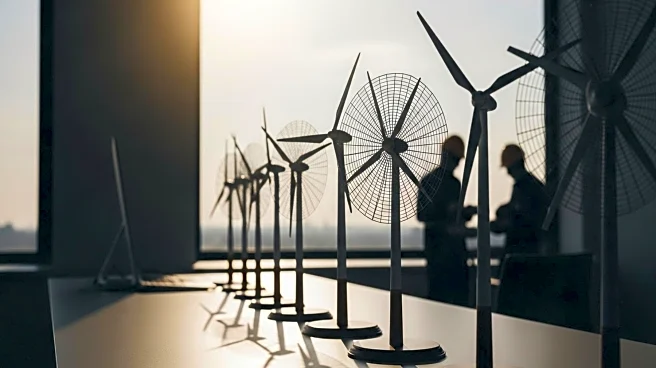What's Happening?
The Trump administration has issued a stop-work order on a wind farm project off the coast of Rhode Island, impacting the jobs of approximately 1,000 skilled workers. Sean McGarvey, president of North America's Building Trades Unions (NABTU), expressed concern over the decision, highlighting the disruption to workers who have spent years training and contributing to the project. The wind farm was nearing completion when the order was given. ISO New England, responsible for grid operations in six states, had included the project in its analysis for grid reliability. The halt has raised questions about the future of renewable energy projects and their role in the U.S. energy landscape.
Why It's Important?
The halt of the wind farm project has significant implications for the renewable energy sector and the U.S. workforce. It underscores the challenges faced by renewable energy initiatives under the Trump administration, which has been known for its support of traditional energy sources like coal and oil. The decision affects not only the workers directly involved but also the broader push towards sustainable energy solutions. The disruption may lead to delays in achieving energy independence and reducing carbon emissions, impacting environmental goals and economic growth in the renewable sector. Stakeholders in the energy industry and environmental advocacy groups are likely to scrutinize this decision closely.
What's Next?
The future of the wind farm project remains uncertain, with potential legal and political battles ahead. Stakeholders, including environmental groups and labor unions, may seek to challenge the stop-work order, advocating for the continuation of the project. The decision could also influence upcoming policy discussions on renewable energy and labor rights. As the U.S. navigates its energy strategy, the outcome of this situation may set precedents for how similar projects are handled in the future, affecting investment and development in the renewable energy sector.
Beyond the Headlines
The halt of the wind farm project raises broader questions about the U.S. commitment to renewable energy and climate change mitigation. It highlights the tension between economic interests and environmental priorities, as well as the role of government in shaping energy policy. The decision may also affect international perceptions of the U.S. as a leader in climate action, potentially influencing global partnerships and agreements. The ethical considerations of prioritizing traditional energy sources over sustainable alternatives could become a focal point in public discourse.









